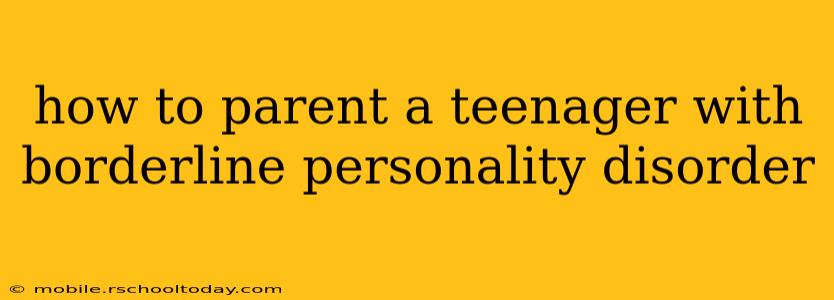Parenting a teenager is challenging under the best of circumstances. Adding a diagnosis of Borderline Personality Disorder (BPD) significantly increases the complexity and demands placed on families. This guide offers practical strategies and insights to navigate this difficult journey. It's crucial to remember that every teenager with BPD is unique, and what works for one family might not work for another. This information is for guidance and should not replace professional help from therapists and medical professionals.
Understanding Borderline Personality Disorder in Teenagers
Before diving into parenting strategies, it's essential to understand the core features of BPD in adolescents. BPD is a mental health condition characterized by intense emotional instability, impulsive behavior, and troubled relationships. Common symptoms in teenagers might include:
- Intense fear of abandonment: This can manifest as clinginess, frequent calls, and intense reactions to perceived rejection.
- Unstable relationships: Relationships with peers and family members can fluctuate wildly between idealization and devaluation.
- Identity disturbance: Teenagers with BPD may struggle with a sense of self and experience significant shifts in their values, goals, and self-image.
- Impulsivity: This can involve risky behaviors like self-harm, substance abuse, reckless driving, or binge eating.
- Suicidal thoughts and behaviors: Sadly, suicidal ideation and attempts are a serious concern for teenagers with BPD.
- Emotional dysregulation: Extreme mood swings, intense anger, and difficulty managing emotions are common.
What are the best ways to help a teenager with BPD?
This is a multifaceted question requiring a multi-pronged approach. Effective strategies often involve a combination of professional guidance, family therapy, and consistent parental support.
1. Seeking Professional Help:
This is the single most important step. A qualified therapist specializing in BPD and adolescent mental health can provide a diagnosis, develop a treatment plan, and offer crucial support for both the teenager and the family. Therapies like Dialectical Behavior Therapy (DBT) are often highly effective in treating BPD.
2. Creating a Stable and Predictable Environment:
Consistency is key. Establish clear rules and expectations, and enforce them consistently. This provides a sense of security and predictability, which can be incredibly helpful for teenagers struggling with emotional instability.
3. Validating Their Emotions (Without Enabling):
Teenagers with BPD often feel misunderstood. Acknowledge and validate their feelings, even if you don't agree with their behavior. For example, you might say, "I understand you're feeling hurt right now, but throwing your phone is not the way to handle it."
4. Setting Healthy Boundaries:
It's vital to set and maintain healthy boundaries. This protects both you and your teenager. Consistent boundary setting helps prevent manipulative behavior and teaches them about responsible behavior.
5. Learning to Manage Emotional Dysregulation:
Equip yourself and your teenager with coping mechanisms for managing intense emotions. This might include mindfulness techniques, deep breathing exercises, or journaling.
6. Family Therapy:
Family therapy can be invaluable. It provides a safe space to address family dynamics, improve communication, and learn effective strategies for managing conflict.
How do I communicate with my teenager with BPD?
Communication is crucial, but it requires a nuanced approach.
1. Active Listening:
Truly listen to what your teenager is saying, without interrupting or judging. Try to understand their perspective, even if you don't agree with it.
2. Clear and Concise Communication:
Avoid ambiguity. Use clear and direct language to avoid misunderstandings.
3. Avoiding Arguments:
Arguments can escalate quickly. If a conversation becomes heated, take a break and return to it later when you're both calmer.
What are common challenges faced by parents of teenagers with BPD?
Parents frequently encounter:
- Emotional exhaustion: The constant emotional demands can be draining.
- Feeling helpless: It can be difficult to know how to best help your teenager.
- Strained family relationships: BPD can put a strain on sibling relationships and the overall family dynamic.
- Guilt and self-blame: Parents often blame themselves, but it's essential to remember that BPD is a complex condition.
Is it common for teenagers to have BPD?
BPD is less common in teenagers than in adults, but it's still a significant concern. Early diagnosis and intervention are essential.
What kind of treatment is available for teenage BPD?
Dialectical Behavior Therapy (DBT) is often the most effective treatment, often combined with medication to manage symptoms like anxiety or depression.
Remember, parenting a teenager with BPD requires patience, understanding, and professional support. Seeking help is a sign of strength, not weakness. With the right support and strategies, you can help your teenager navigate their challenges and lead a fulfilling life.
